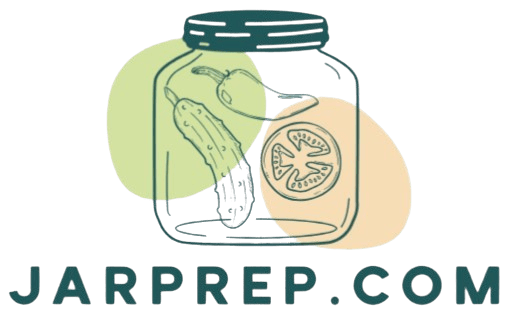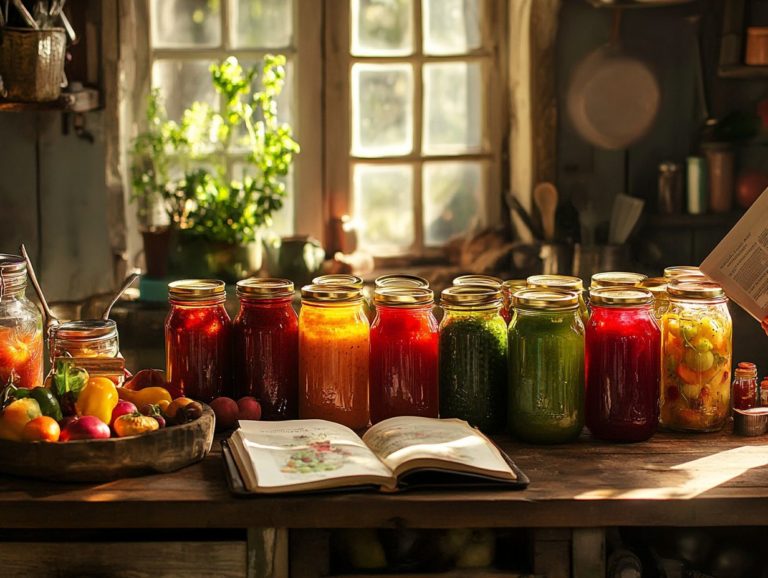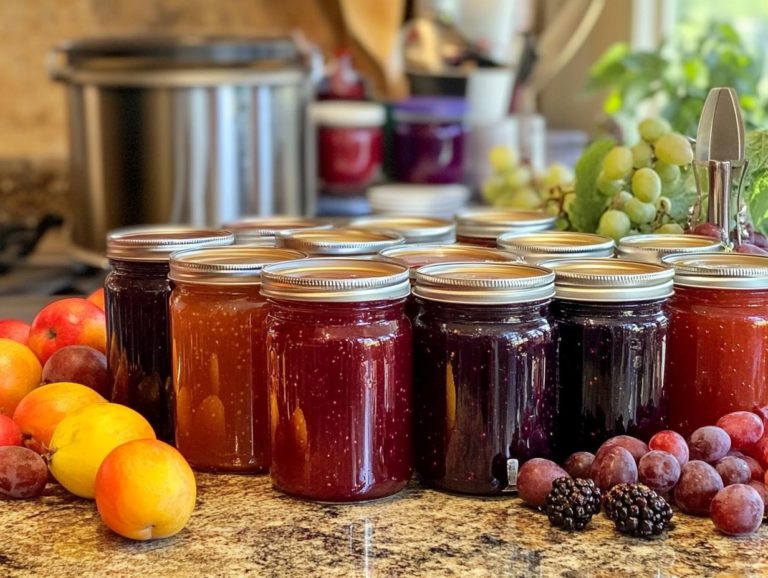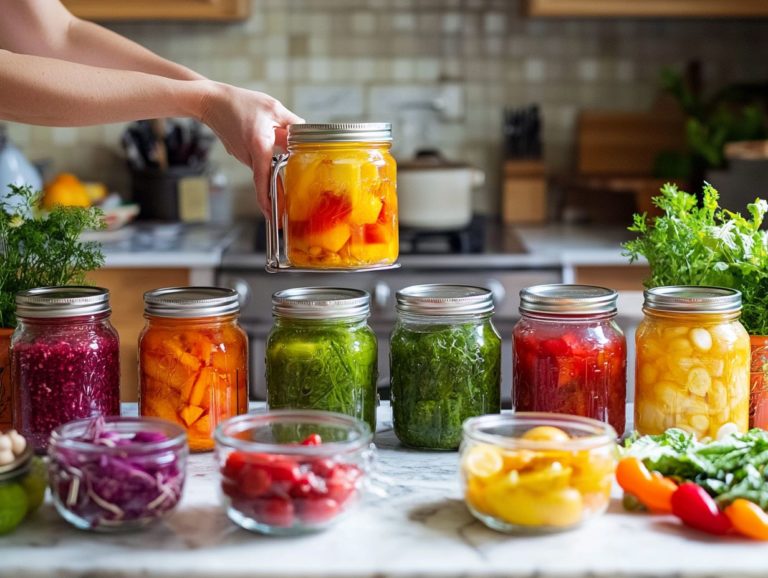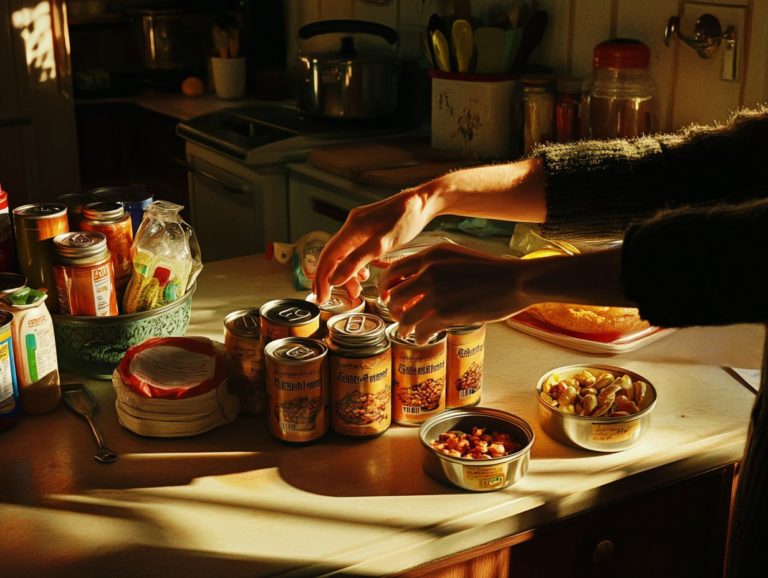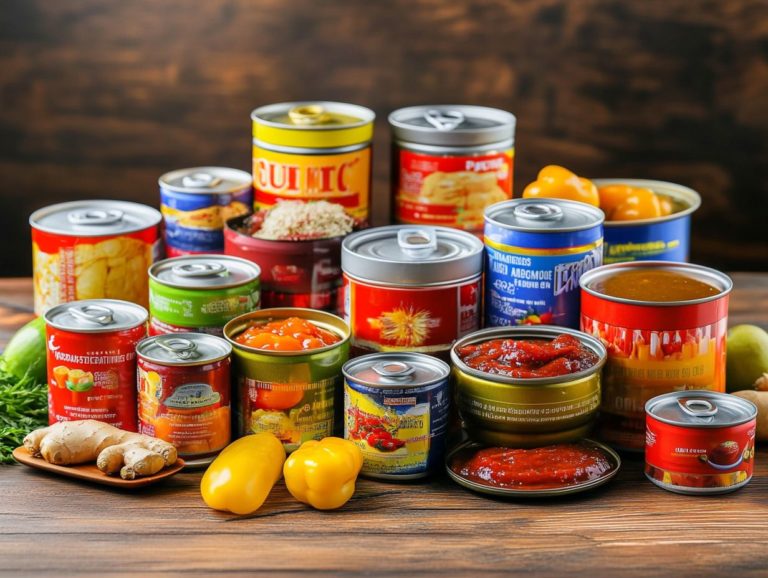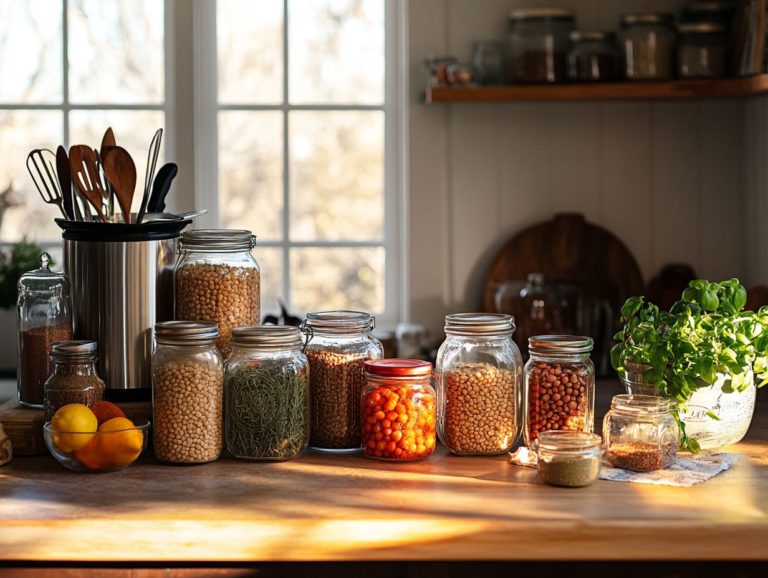Can I Can Dairy Products?
Canning dairy products might strike you as unconventional, yet it presents an intriguing method for preserving these perishable items, such as cow’s milk and goat’s milk.
Let s explore how canning can transform your kitchen! This article delves into the essence of canning and the reasons behind its application to dairy, including methods to preserve milk effectively. You ll uncover benefits like extended shelf life and undeniable convenience while being mindful of potential risks such as Botulism, a serious illness caused by bacteria that can grow in improperly canned foods, and bacterial contamination that can arise from improper canning techniques.
We ll also share safe techniques for home canning, such as using both a pressure canner and a water bath canner, along with alternative preservation methods that might pique your interest. Whether you re just starting your canning journey or you re a seasoned expert from the Amish community or among Rebel Canners, there s a wealth of valuable information waiting for you!
Contents
Key Takeaways:

- Canning dairy products can extend their shelf life and make them more convenient to use, but it is important to understand the risks involved.
- Bacterial contamination and health concerns are potential risks of canning dairy products, so it is crucial to follow recommended techniques and use proper equipment when canning at home.
- If canning dairy products seems too risky, there are alternative methods of preserving them, such as freezing or using commercial canning facilities.
Understanding Canning Dairy Products
Canning dairy products, whether it’s raw milk, store-bought milk, or even homogenized milk, is an invaluable technique for food preservation that enables you to create shelf-stable options perfect for cooking with milk, cheese-making, and other culinary delights.
This effective method requires specific kitchen tools, like a pressure canner or a water bath canner, to ensure safety and effectiveness, especially when it comes to low-acid foods that could be a breeding ground for Botulism bacteria. Using quart jars is essential for proper storage.
By mastering the intricacies of canning dairy, you empower yourself, much like members of the Amish community and Rebel Canners, to significantly extend the shelf life of your dairy products, including canned dairy.
What is Canning and Why is it Used for Dairy Products?
Canning is an effective method of food preservation that involves sealing food in quart jars to prevent spoilage. This technique is especially beneficial for dairy products, such as raw milk, store-bought milk, and canning milk, as it significantly extends their shelf life.
The science behind canning hinges on the principles of heat treatment and vacuum sealing, which work together to eliminate harmful bacteria and enzymes responsible for spoilage, helping to manage risks from Botulism. By heating the contents of the jars, processes like pasteurization effectively neutralize threats such as Botulism, a dangerous toxin produced by certain bacteria. This is particularly vital when preserving dairy, where the risk of pathogenic bacteria is elevated.
You can also successfully can evaporated milk and condensed milk, or even homemade milk, prolonging their usability while ensuring safety. However, it’s essential to approach canning dairy products with caution, as their unique properties can impact the effectiveness of the preservation process.
Benefits of Canning Dairy Products
Canning dairy products presents a wealth of advantages, from extending shelf life to providing convenience in food storage, including energy savings. This method not only adds to your culinary flexibility but also offers potential energy savings. It s an appealing choice for anyone who frequently incorporates milk into their cooking and baking routines!
Dive into the world of canning and enjoy delicious dairy products whenever you want!
Extended Shelf Life and Convenience
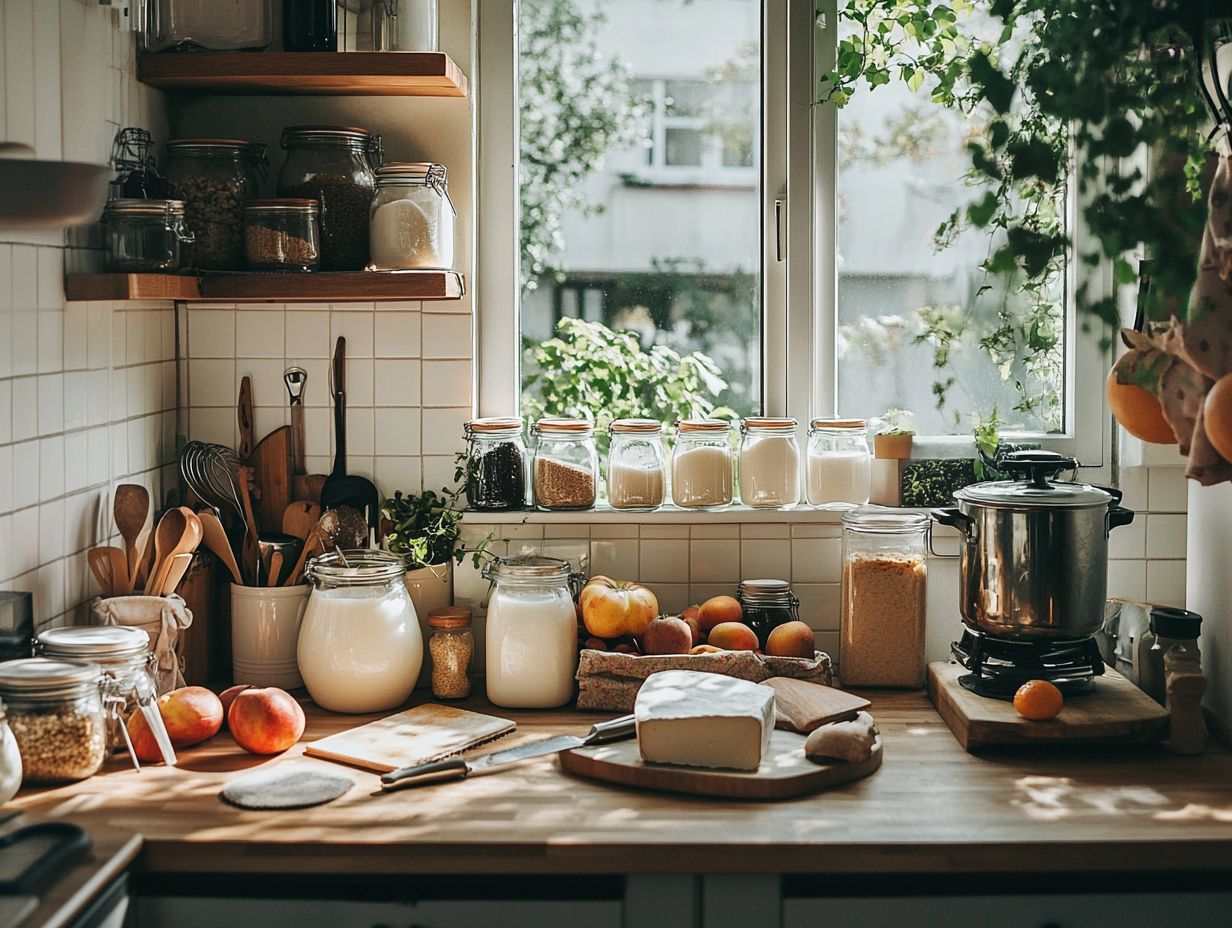
One of the standout benefits of canning dairy products is the remarkable shelf life it offers. You can create canned milk that remains viable for months or even years, ensuring a reliable supply for all your cooking needs.
This long shelf life means you ll spend less time shopping. It saves you both time and money in your busy life, allowing you to enjoy cooking with milk without hassle.
You can stock up on canned items, keeping your pantry well-stocked with canned milk while significantly reducing food waste.
Canned milk is incredibly versatile. It seamlessly fits into a wide range of recipes from creamy soups to delectable baked goods making it an essential ingredient for your culinary endeavors, especially for cheese making.
With this convenient option at your fingertips, you can whip up meals without a hitch, even when fresh grocery runs aren t possible. It guarantees that everyone in your household enjoys nourishing dishes, no matter the circumstances.
Potential Risks of Canning Dairy Products
While canning dairy products offers a wealth of advantages, it s crucial for you to remain mindful of the potential risks involved, especially from improper canning techniques. Bacterial contamination and health concerns can lead to serious issues, such as botulism.
By staying informed, you can safely tackle these challenges and enjoy delicious canned dairy!
Bacterial Contamination and Health Concerns
Bacterial contamination poses a significant threat when canning dairy products. Improper techniques can allow harmful pathogens, like Botulism bacteria, to flourish if proper sanitation and safe handling practices are not followed.
This underscores the critical need for strict food safety practices, including sanitizing jars and using appropriate temperature settings.
Dairy products are particularly susceptible due to their moisture content and rich in nutrients, creating an environment conducive to the growth of various bacteria.
These include Salmonella, E. coli, and other pathogens if the canning process is not performed correctly. The symptoms of related health issues can vary widely, from mild gastrointestinal discomfort to severe food poisoning.
Utilizing pressure canners is crucial for effectively managing these threats. They achieve the high temperatures necessary for eliminating bacteria and ensuring a safe canning process.
Thorough sanitation of jars, lids, and equipment, along with strict adherence to recommended processing times and temperatures, can significantly mitigate the risk of contamination.
Ensuring that dairy products are fresh and stored appropriately before canning is essential for maintaining overall food safety.
How to Safely Can Dairy Products at Home
Successfully canning dairy products at home demands a solid grasp of safety protocols and the right equipment. This includes a pressure canner, water bath canner, and quart jars, all essential to ensure that the preservation process is both effective and secure.
Don t wait! Start canning your dairy products safely today!
Recommended Techniques and Equipment

For a successful canning experience with dairy products, you ll want to employ either a pressure canner or a water bath canner. A pressure canner uses steam under pressure to kill bacteria, making it ideal for low-acid foods. A water bath canner uses boiling water to preserve high-acid foods. Complement this with quality kitchen tools like quart jars to fill and close jars securely. This combination is key to effective preservation and safety.
Choosing between a pressure canner and a water bath canner can make a significant difference in the quality and shelf life of your canned goods, especially when preserving low-acid foods. Pressure canning is essential for these foods, while high-acid options thrive in a water bath.
Selecting the right jars and lids those specifically designed for canning ensures a tight seal that prevents spoilage during the canning process. Using the correct tools, such as jar lifters and funnels, along with ensuring proper sanitation, will streamline the process and keep your kitchen accidents to a minimum.
Follow tested recipes for the best results and enjoy delicious homemade cheese that you can be proud of. It s vital to stick to proper processing times, ensuring a safe and tasty final product.
Alternatives to Canning Dairy Products
If you’re looking for alternatives to canning dairy products, you have a range of ways to keep food fresh available, including freezing milk or creating homemade cheese.
Consider freezing milk or crafting your own homemade cheese. Both options can offer substantial energy savings while ensuring that quality remains intact over time.
Exploring Other Preservation Methods
Exploring alternative preservation methods for dairy products opens up a world of options, such as freezing milk, making homemade cheese, and embracing fermentation to enhance flavor. Each technique brings unique advantages for food storage and culinary creativity.
These methods not only extend the shelf life of your dairy but also elevate its flavor and enhance its nutritional profile, ensuring your family enjoys healthy meals. For example, use airtight containers to prevent freezer burn while freezing milk. Making homemade cheese adds a delightful touch of creativity to your kitchen, allowing you to experiment with fresh ingredients, including herbs and spices.
Fermentation fosters beneficial bacteria that can significantly boost gut health, making it a popular choice among health-conscious individuals. Start reducing food waste today while indulging in more adventurous cooking by embracing creative techniques like fermentation.
If you’re accustomed to canning, these methods offer fresh and innovative ways to utilize dairy without compromising on safety and quality, particularly when using storage techniques that preserve freshness.
Frequently Asked Questions
Wondering if you can can dairy products?

Yes, it is possible to can dairy products, including canned milk and homemade cheese. However, there are important factors to consider before attempting to can dairy products at home, such as ensuring proper temperature and heating methods.
What are the recommended dairy products for canning?
The recommended dairy products for canning are milk, cream, butter, and cheese, especially those like raw milk cheddar that are more stable for the canning process. These products have higher acidity levels, making them safer for canning. Avoid canning low-acid dairy products such as sour cream and yogurt due to their susceptibility to bacterial contamination.
What equipment do I need to can dairy products?
You will need a pressure canner, glass canning jars, lids, and bands to can dairy products. It is crucial to use a pressure canner for dairy canning as it can reach higher temperatures needed to kill harmful bacteria. You will also need a jar lifter, canning funnel, and kitchen towel for safe and efficient canning.
Try these methods this weekend to elevate your kitchen skills!
Can I Can Raw Milk or Cream?
No, it is not safe to can raw milk or cream. Always use pasteurized dairy products for canning to protect your health!
How Long Can Canned Dairy Products Last?
Store canned dairy products in a cool, dry place. They should last 1 to 2 years.
Always check expiration dates before consuming. If you notice any spoilage, like discoloration or an off odor, do not eat the product.
What Safety Precautions Should I Follow When Canning Dairy Products?
Follow proper canning techniques to ensure safety. Use clean equipment and adhere to recommended processing times and temperatures.
Always check for spoilage signs before consuming. Your health is worth it!
